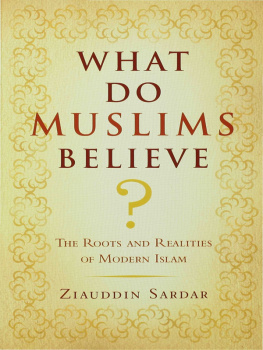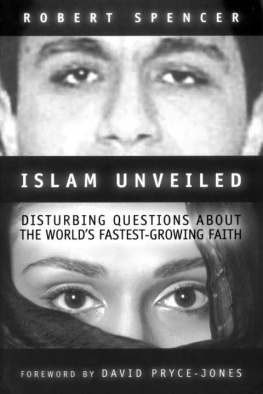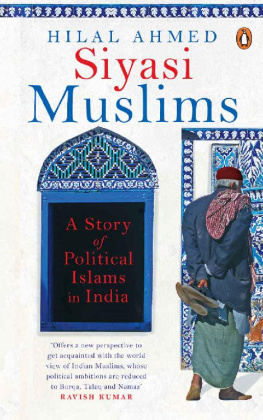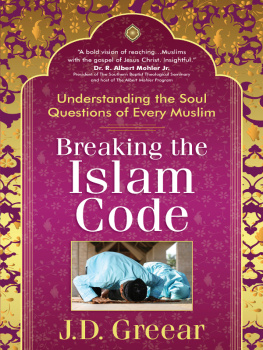


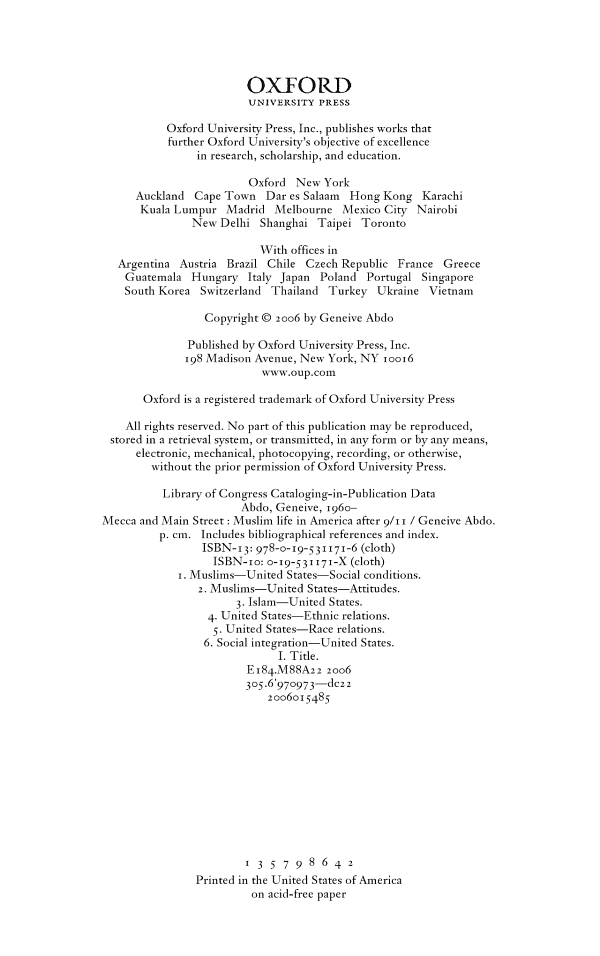
Acknowledgments
I am forever grateful to the main characters in this book. They shared intimate details of their lives with me during a period of unease at home and abroad. Many taught me not only what it is to be a Muslim in America, but how their faith can help ease the difficulties of living in the contemporary world. I
From the beginning, Yusra Gomaa was my guide through the Islamic community, my researcher, and a model for the young generation of Muslim Americans. Her intelligence, determination, and belief in the central theme of this book were a great inspiration. Her life story appears later in these pages.
In Chicago, many friends and acquaintances helped along the way. My conversations over a few years with Dr. Umar Faruq Abdallah, Dr. Scott Alexander, and Dr. Abdul Malik Mujahid taught me to take note of the many nuances of Muslim life that are documented throughout the book. In Detroit, Saeed Khan and Patrick Cates were the first activists I met who opened my eyes to the diversity of mosques. Through them, I met Dr. Ihsan Bagby, whose admirable field research on this subject greatly enhanced my own work.
There are also the life-long helpers, the people who have provided stimulation and inspiration since I began writing about contemporary Islam more than a decade ago. I am grateful to Dr. John Esposito for his unwavering support. Cynthia Read, my editor at Oxford University Press, has maintained faith in my work, even when my ideas have contradicted conventional wisdom. She is a rare and gifted editor in American publishing. Jonathan Lyons, who edited and read every page, was an invaluable critic.
I am grateful to my agent, Laura Langlie, who lowered my stress level and helped beyond the call of duty. The novelist Christina Baker-Kline improved my narratives and storytelling.
This book was funded in part through a grant from the Earhart Foundation. I owe the foundation many thanks for its continuous support.
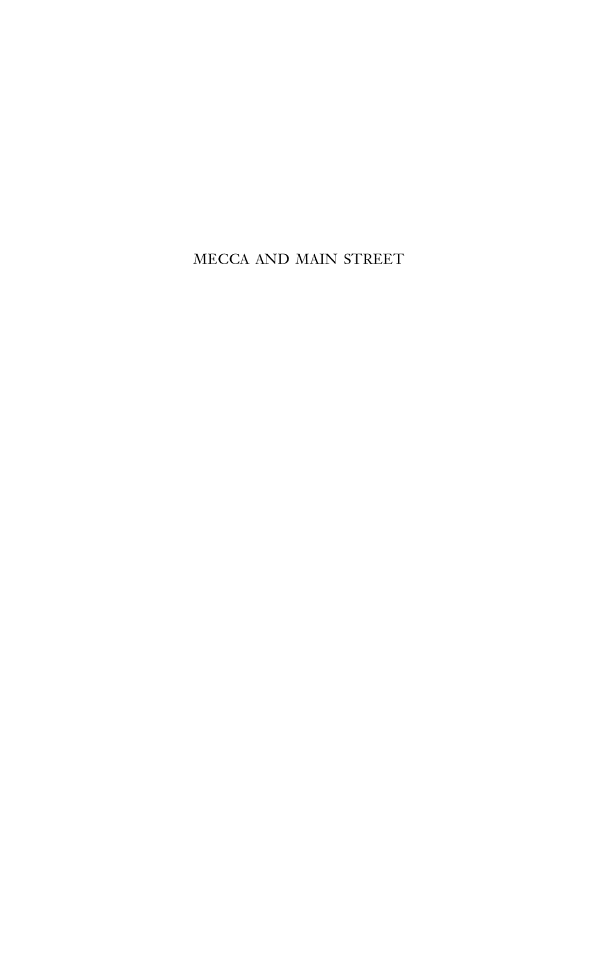
Prologue: Beginnings
I first thought about writing this book, often with mixed emotions, during the days following September 11, 2001. My ambivalence turned to conviction one chilly afternoon in 2003 as I strolled through a San Francisco neighborhood with Maad Abu Ghazalah. Maad was running for a seat in the U.S. Congress, and I had asked if I could campaign door-todoor with him. I wanted to see how one of Americas most liberal cities might respond to a Muslim and an Arab seeking public office. I had never been to San Francisco until that day, but I believed the stereotype of a city with open-minded, tolerant citizens. Certainly this enlightened thinking would apply to Maad, especially because there are no immediate physical clues that he is an Arab. With his light skin, green eyes, and sandy brown hair, he could be Italian or Greek or French.
The neighborhood overlooked San Francisco Bay, giving homeowners a spectacular view of the clear, deep blue water. When we walked up the hill to the first set of houses and rang the doorbells, no one seemed to be at home. But after a few minutes, we found our first couple willing to open their door for a chat.
Hello, my name is Maad Abu Ghazalah and I am running for Congress in your district, Maad told the couple, extending his hand past the front-door screen to offer them his campaign literature.
There were a few moments of silence. Then the man blurted out, as if Maad were nowhere in sight, With this name, I would say this guy doesnt have a chance. M-a-a-ad Abu Ghazalah. Not a chance.
While I tried to keep my jaw from dropping, Maad did not flinch. He was apparently used to this kind of reaction. I was born in Palestine. I live in San Francisco and graduated from Notre Dame. I am running for Congress because Im concerned about our foreign policy, he replied, deadpan.
The woman tried to take the edge off her husbands remark. We need to know where you stand, she told Maad, because many people will just see your name and think, I dont want to go down that road.
Where Maad stood was beside the point. He was against the Iraq war. He favored bringing the troops homeviews the couple said they shared. But that was obviously not enough for them.
As we continued walking along the street, I wondered why Maad put himself through such unnecessary humiliation. I couldnt understand it. Here was a successful lawyer who certainly did not need to subject himself to bigotry and ignorance. We walked a bit more, but had little success persuading voters that Maad was their man for Congress. Only one person reacted favorably.
The cool breeze and the human chill from the San Franciscans, whom I thought would be free thinkers, made me want to end the campaigning. Maad agreed, somewhat reluctantly, after we had visited nearly every house along the street. I was curious to know how he felt, but we had just met that morning and I didnt feel comfortable asking him personal questions. I posed my question delicately: So Maad, do you think you will continue campaigning? Do you think you are doing the right thing?
He grinned a bit. I have one vote and one hundred thousand to go, he said, referring to the one positive response. I am not running to win. I am running so the next generation of Muslims might have a chance.
Later that day, on the plane out of San Francisco, I realized that the contemporary Muslim American experience should be documented. Life had changed dramatically for the countrys six million Muslims. But because America was focused on Muslims living nearly everywhere else but at homein Afghanistan, Iraq, Iran, Syria, and Pakistanthe story of their changing lives had been left untold.
For more than a century Muslims had lived in America in peace, blending into the ethnically diverse landscape. But suddenly, they were no longer in the shadows as an all but invisible minority. From now on, their every word would be noted, their every action seized upon by a nation gripped with fear and inflamed by political manipulation. The event that launched Americas War on Terrorisma war that many Muslims at home and abroad understand as directed at Islam itselfcreated for them a new American reality. Like the couple who greeted Maad Abu Ghazalah, much of America had embraced a black-and-white view: Muslims are terrorists; Islam is a religion of violence; Muslims are backward; Muslims are vengeful toward the West.
Mecca and Main Street: Muslim Life in America after 9/11 details the search by a diverse group of Muslims to find a way to live with dignity in this country. While many Muslims shared a growing desire to become more involved and educated about their faith long before September 11, in the wake of the attacks on Washington and New York, they felt an urgent need to embrace their beliefs and establish an Islamic identity as a unified community. A glance at the American horizon confirms this. A decade ago, it was unusual to spot a minaret. But now they can be seen in most major cities and many smaller ones, as well. Women in headscarves are an increasingly common sight in the nations shopping malls, offices, schools and even health clubs. Employers are now asked to allow Muslim workers to take time off for daily prayers.



